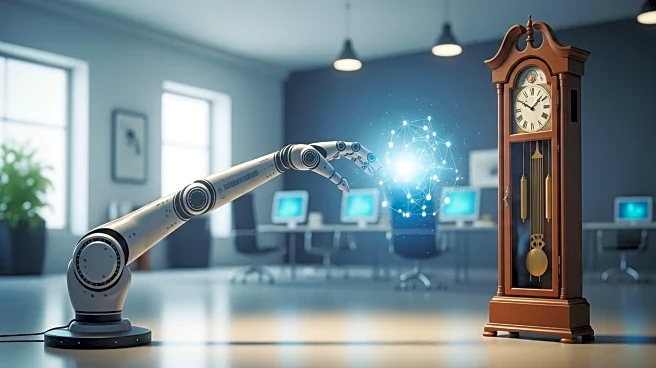What is the story about?
What's Happening?
David Zervos, a contributor to CNBC and a market analyst, has raised concerns about the Federal Reserve's approach to the labor market amidst the rapid growth of artificial intelligence (AI). Zervos highlighted that while AI is driving strong economic growth, it poses significant challenges to job creation. He noted that the economy could grow at rates of 3.5% to 4%, yet unemployment might rise due to AI's impact on jobs. Zervos emphasized that the Federal Reserve should prioritize addressing labor market issues over inflation concerns, as AI could lead to the loss of three to five million jobs in the next few years. His comments come as he is considered a potential candidate to replace Fed Chair Jerome Powell.
Why It's Important?
The concerns raised by Zervos underscore the potential disruption AI could cause in the labor market, which may have significant implications for U.S. economic policy. If AI leads to substantial job losses, it could increase unemployment rates, affecting consumer spending and economic stability. The Federal Reserve's mandate includes maintaining full employment, and Zervos suggests that the central bank should focus more on this aspect rather than inflation. This shift in focus could influence monetary policy decisions, impacting interest rates and economic growth strategies. Stakeholders such as businesses, policymakers, and workers may need to adapt to these changes, potentially reshaping the U.S. labor market and economic landscape.
What's Next?
As AI continues to evolve, the Federal Reserve may need to reassess its priorities to address the potential job displacement caused by technological advancements. This could involve developing new strategies to support workforce transition and retraining programs. Policymakers might also consider implementing measures to mitigate the impact of AI on employment, such as incentivizing industries that create jobs or investing in education and skills development. The ongoing debate about AI's role in the economy may lead to further discussions among economists, business leaders, and government officials about balancing technological progress with employment stability.
Beyond the Headlines
The rise of AI presents ethical and cultural challenges, as society grapples with the implications of automation on human labor. The potential job losses could exacerbate income inequality and social tensions, prompting discussions about the ethical responsibilities of AI developers and companies. Additionally, the cultural shift towards a more automated workforce may require changes in education systems to prepare future generations for new types of jobs. Long-term, the integration of AI into the economy could redefine work and productivity, necessitating a reevaluation of societal values and priorities.















